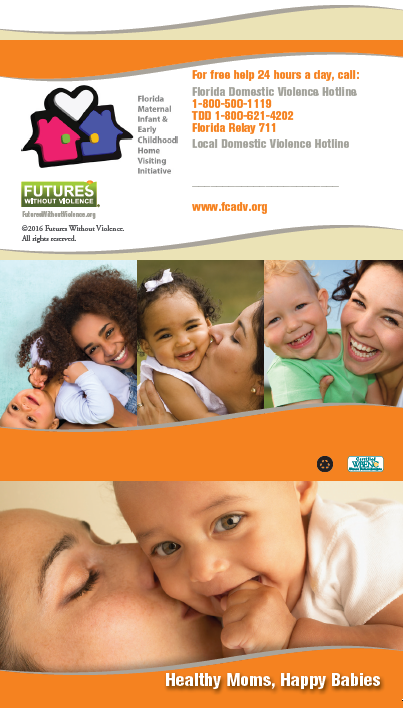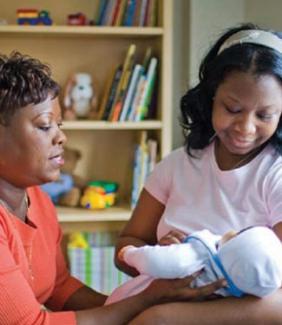By Katie Hood and Ghia Kelly, Florida MIECHV Initiative
Intimate partner violence (IPV) is a major public health issue with implications for maternal and child health. IPV has well-documented, long-lasting physical, sexual, mental, and emotional health effects. During pregnancy, IPV has been linked to poor maternal health and birth outcomes such as low birth weight, preterm birth, and neonatal death. Additionally, adverse physical, emotional, behavioral, social, and cognitive outcomes have been associated with children’s exposure to IPV in the home. Effective interventions in cases of IPV are thus critical to reduce the risks of these adverse effects. However, supporting families experiencing IPV can often be challenging given the “complex, potentially dangerous, and often stigmatized nature of this problem” (Ngozichukwuka et al., 2019).
Early childhood home visiting programs provide in-home services and support for parents and their children from birth to age five. Research shows that home visits by a nurse, social worker or other trained professional during pregnancy and early childhood can improve the lives of children and families. While home visiting can benefit any new or expectant parent, it can be especially helpful for those living on the margins and facing additional challenges such as economic insecurity, inadequate housing and lack of access to consistent and affordable health care. For families experiencing domestic violence (or intimate partner violence), home visitors can play a key role in screening for abuse, assisting with safety planning and providing referrals to advocacy services.
Partnerships between domestic violence advocates and home visitors have emerged as a promising model for the prevention of future abuse and for helping families heal from trauma. This TAQ highlights the experiences of a collaborative initiative implemented in the state of Florida to better equip home visitors to offer support to families experiencing or at-risk for intimate partner violence.
About Florida’s Initiative
States use a mix of federal, state, local, and private funding to support home visiting programs, with over $1 billion invested nationally. Maternal, Infant, and Early Childhood Home Visiting (MIECHV) is one federal program that implements evidence-based home visiting programs in every U.S. state, the District of Columbia, five territories, and 25 tribal entities. The goals for every MIECHV program are to:
- improve maternal and child health,
- prevent child abuse and neglect,
- encourage positive parenting, and
- promote child development and school readiness.
In 2018, the Florida MIECHV Initiative provided more than 29,000 home visits to 2,546 families. In accordance with the federally mandated performance measures, these families are screened for intimate partner violence using a validated tool within 6 months of enrollment and are provided referral information if the screen is positive.
Florida MIECHV has chosen to take a deep dive into the complexities of IPV in order to better serve our families who are experiencing this type of violence. Our partnership with the state domestic violence coalition and the local domestic violence centers have been an integral part of the process with both our continuous quality improvement (CQI) efforts and professional development for our local programs.
In Florida, community-based domestic violence programs are known as “domestic violence centers,” and they are subject to state certification. The minimum standards for certification were developed by the Department of Children and Families in partnership with the Florida Coalition Against Domestic Violence to ensure the health and safety of center participants. For more information, see Domestic Violence Certification Pamphlet and Domestic Violence Center Certification Laws, Rules, and more. Throughout this TAQ, “programs” are used to refer to home visitation programs, whereas “DV centers” or “certified centers” refer to local domestic violence organizations.
Relationship Building
In 2015, Florida MIECHV launched a statewide CQI learning collaborative (LC) focused on improving our IPV screening rates and the initiation of safety plans and referrals for those who are experiencing violence. Continuous Quality Improvement (CQI) is an ongoing cycle of collecting data and using it to make decisions to gradually improve program processes. Leadership from our state DV coalition actively participated on the faculty for this LC, serving as the Faculty Chair and a content expert for the duration of the project. We also had staff from the coalition facilitate sessions on various topics at our in-person meetings, including:
- screening and identifying IPV,
- safety planning and coordinating with certified DV centers,
- supervising survivors,
- mandated reporting of child abuse when IPV is present, and
- using a trauma informed approach with families.
We also required that participating programs partner with their local certified DV centers throughout the project in order to improve their working relationship and build their capacity to support survivors and their children. The activities that came from the local partnerships largely depended on what the home visiting programs were trying to accomplish. Some focused their efforts on increasing screening rates and developing scripts to increase the comfort of home visitors when introducing a screen, while others worked on fleshing out their referral process and making a “warm handoff” to the DV center.
Some sites involved survivors in the process by getting their feedback on screening introduction scripts and the referral process. Most sites were simultaneously working to develop policies and protocols around IPV, and their local centers were there to provide their expertise and guidance throughout the process. The relationships that were developed between home visiting programs and certified DV centers continue to be one of the most successful aspects of the entire learning collaborative. Advocates and home visitors were able to gain a better understanding of each other’s role in supporting survivors and the added protections given to DV advocates and certified domestic violence centers such as DV advocate-victim privilege. By the end, screening rates rose to 91% and 98% of women with a positive screen were referred for services. The home visiting teams have sustained their efforts and screen and refer at very high rates (92% and 94% respectively for FFY 2018).
“I think for me, success is when the woman or participant or client is feeling comfortable and confident with her decision and her choice.” – Home Visitor
Skills and Tools for Home Visitors
Home visitors have a unique role when working with families affected by IPV. They work intimately with families for extended periods of time, sometimes as long as 5 years, in their homes. Not only do they develop a level of trust that is uncommon for a helping professional, but they are also in a position to observe family behaviors and other indicators of IPV in the most private setting. Making sure home visitors feel equipped to recognize the signs and behaviors associated with battering and safely provide resources and support to survivors and their children is critical.
Florida MIECHV requires that all home visitors attend a 2.5-day training on IPV that was developed in partnership with our state DV coalition. While the training has been offered since the origination of Florida MIECHV, it was heavily revised over the last year to incorporate what we learned from the IPV Learning Collaborative. The training is comprised of 7 sections: 
- Definitions, Dynamics, and Cultural Influences
- Battering Behaviors
- Impacts of Intimate Partner Violence and the Power of Resilience
- The Role of the Home Visitor
- Factors to Decision Making for Survivors and Barriers They May Face
- Universal Intimate Partner Violence Screening and Education
- Planning for Safety
The importance of partnering with the local DV center is woven throughout the training and emphasized in section 4, The Role of the Home Visitor. We not only discuss the ways in which the DV center can support the survivor, but also how they can support the home visitor. We recognize that our home visitors are not experts in DV and suggest that they reach out to an advocate when struggling with a case. An example of this would be when a survivor makes the choice not to seek services through the certified DV center. The home visitor can reach out to an advocate, while protecting the identity of the participant, to gain input on additional resources to offer and considerations to make when planning for safety with the survivor.
“We have to really advocate for survivors at that [community] level which is why the relationship with the [DV] centers is extremely important.” – Home Visitor
Moving Forward
Florida MIECHV is committed to continuing our partnership with our state domestic violence coalition and local certified DV centers. We require our local programs to have a meaningful Memorandum of Understanding (MOU) with their local certified DV center(s), which includes:
- roles and responsibilities of both agencies,
- a description of the types of services provided,
- confidentiality and information sharing,
- procedures for cross-training staff from both agencies,
- procedures for the referral processes for both agencies,
- a designated position dedicated to being a point person for each agency,
- a description of strategies and activities necessary to achieve the contents of the MOU, and
- term in effect and review/renewal process.
In communities where the partnership did not come easily, state-level leadership at both Florida MIECHV and the state DV coalition were able to encourage local participation. Reminding both programs that the partnership would be mutually beneficial was key. Our goal at Florida MIECHV is to provide survivors with the information and resources they need in order to make the best choices for their families and partnering with DV experts has helped us to do a better job of that for our families who are experiencing intimate partner violence.
While Florida was the first state to have a Learning Collaborative focused on IPV, the Home Visiting Collaborative Improvement and Innovation Network (HV CoIIN) is currently implementing a national Learning Collaborative on IPV featuring MIECHV teams from 6 states. Many of the states have experienced similar challenges in building partnerships with local domestic violence programs. Florida MIECHV is part of the HV CoIIN faculty, so we are able to share lessons learned and best practices with the other states.
“Having a name and a face with our local shelter gave us the opportunity to get a tour and to have additional information in order to support our clients. We were all much more likely to refer to the shelter after understanding their processes. We have had several clients that have received services either from shelter placement or counseling. We are able to support our clients more effectively after having this connection being made.” – Home Visitor
Additional Resources
Florida Maternal, Infant & Early Childhood Home Visiting Initiative
Domestic Violence Protocol for Home Visiting Programs
Making the Connection: Home Visitors + Advocates = An Innovative Partnership
Futures Without Violence works with home visitation programs to provide domestic violence and child abuse training and education. Their resources include:
- Home Visitation: Healthy Moms, Happy Babies Train the Trainer Curriculum
- Realizing the Promise of Home Visitation: Addressing Domestic Violence and Child Maltreatment
- Healthy Moms, Happy Babies: Home Visitation Safety Cards in English and Spanish
- Healthy Moms, Happy Babies Posters in English and Spanish
- Women Are Sacred: American Indian/Alaskan Native Safety Card
- We Are Worthy: American Indian/Alaskan Native Safety Card
- Young Moms, Strong Kids: Home Visitation and Adolescent Parent Safety Card














